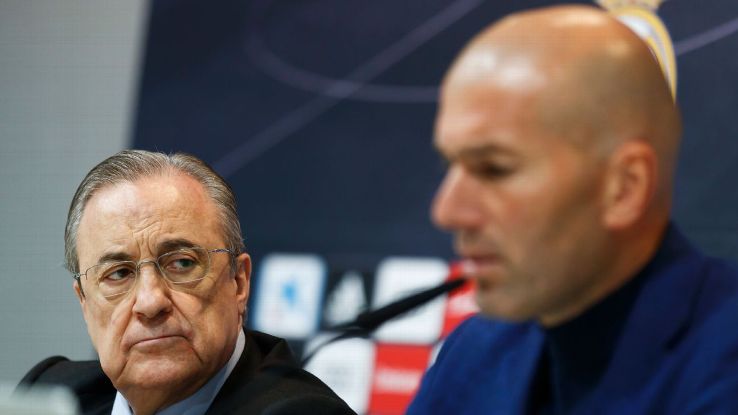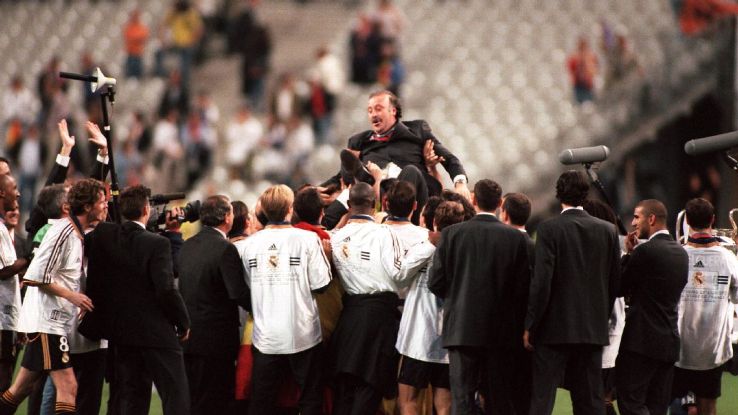


Gab Marcotti reveals some of the candidates and his early pick for the next Real Madrid manager.

With the Real Madrid job up for grabs, Alexis Nunes and Shaka Hislop debate whether Arsene Wenger is fit to succeed Zinedine Zidane.

The ESPN FC crew delve into the factors that led Zinedine Zidane to resign after leading Real Madrid to three consecutive UCL titles.

ESPN FC’s Craig Burley explains why Gareth Bale should sit tight and bide his time at Real Madrid before moving elsewhere.

The FC panel answer your tweets on all things Real Madrid following Zinedine Zidane’s departure and share their picks for the World Cup semifinals.
John Toshack once described going into the Santiago Bernabeu dressing room as being like heading into Baghdad. Jose Mourinho complained that his Real Madrid players had stuck a “knife in my back” and vowed to find the “rat” who leaked team news to the media, spitting “I’m f—ing sick and tired of you all” before throwing a bottle against the wall and storming out. His goalkeeper coach told Jerzy Dudek that Mourinho’s experience there “left a scar on his soul” and somehow, he has never been the same since.
As for Rafa Benitez, he left the club that he had always supported feeling burnt and unloved. On the morning of his sacking after the media had already found out, Benitez still didn’t know, the board pushing him out without a word. No one really lamented his passing; some in the dressing room had decided he was no good for them as early as preseason. Behind his back, the players sarcastically referred to him as “The No. 10.” The point being, of course, that he wasn’t. He had never played and could never “get” them. When he told them how to kick a ball, they resented it, if they didn’t just laugh at it.
Zinedine Zidane was a No. 10. When Benitez was sacked and hurriedly replaced in January 2016, there was silence. It was as if he had never been there at all. There were no good wishes and no thanks, nothing: there was nothing from the board and virtually nothing from the players, either. The contrast is cruel. When Carlo Ancelotti departed, the club might have been cold, but the messages from the squad flooded in, one “gracias, mister” after another.
When Zinedine Zidane walked away from the job on Thursday morning, it happened again: the words of praise and gratitude soon flowed. It made sense: the relationship was largely good and together they had won it all; those two points might not be entirely unrelated, either.
With Zidane, Real Madrid enjoyed the most successful era in their modern history. No team had won the Champions League back-to-back; no team had won three European Cups in a row for 40 years. Zidane did both … in less than three years. And then he decided to depart, at the very top. He did so in part because he could: the decision was his to take when he wanted. Most managers at Madrid don’t get that choice: the decision is made for them. As Ancelotti once admitted: getting sacked is part of the job, especially at the Santiago Bernabeu.
It is part of the job even when, like him, you’re a European champion. After all, while Ancelotti’s second season had unravelled, the club quickly giving up on him concerned at what they saw as a lack of seriousness and sweat, he had won too. Add his era to Zidane’s and Madrid have won four European Cups in five years, a spell unmatched since the first, formative years of the competition when they forged their identity through five consecutive titles. Their best era before that was under Vicente del Bosque, coach when they won the European Cup in 2002 and 2000.
Yet such success did not prevent Ancelotti from getting the sack, just as it did not prevent Del Bosque from getting the sack after four years in which he won two Champions Leagues and two league titles, and just as it did not prevent Zidane from thinking that, after nine titles of his own, the time had come for him to go. He insisted that he was no longer convinced that he could keep on winning, hinting that he saw storms ahead and that the final season had been harder than his public serenity revealed. He also knew that trailing by 17 points domestically was a disaster. But still, he had the European Cup. Again.
 Zidane’s decision to step away might be connected to the kind of manager who can handle Real in the long term.
Zidane’s decision to step away might be connected to the kind of manager who can handle Real in the long term.
Winning was no guarantee, nor is it a faithful portrait of life behind closed doors. Doubts always emerge even in times of plenty. Sacking a winning manager is not necessarily the wrong thing to do, just as keeping hold of a manager who has not won is not necessarily a mistake. Jupp Heynckes was sacked after the 1998 European Cup win — Madrid’s first win in 32 years — and that is often held up as an example of madness, but no-one shed a tear for him. Time has changed the story a little, but back then most were convinced he had to go, including Heynckes, and no one fought for him to stay.
A week before the final, Real club president Lorenzo Sanz called Heynckes and asked how he was. His reply was: “sunk.” When he left a week after the final, he admitted, “This is the right decision; I couldn’t go on working in those conditions.” The captain said he didn’t get the respect he deserved, and his agent said, “He never got the backing of the club.”
“Heynckes is a good coach, but he has given us too much respect,” Christian Panucci said. “The dressing room ate him alive. Ultimately, he couldn’t continue because he couldn’t control the squad. He recognised that himself.”
“It was a tough dressing room, packed with stars. He couldn’t impose the necessary discipline,” Sanz recalled.
And yet, when Heynckes left, he insisted: “There is too much press and too many directors who like to talk. I still think you don’t have to be a dictator, but Madrid need to reflect on how many coaches they have had in recent years.” It’s a diagnosis that still feels pertinent, and, whatever else had happened, he had won the European Cup while refusing to be a dictator.
And in that, for all the differences in personality, he shared something with the men who followed him in lifting the most famous trophy of all. He might have found it harder than they did, ultimately been undone by it all and overwhelmed, but Madrid’s experience in the European Cup suggests that there could be something in the ceding of power to players.
Where Heynckes was not entirely successful — “too nice,” as one player puts it — Zidane might in part have gone because he felt similar strains on his relationships emerge. Those who followed the German shared an ability to manage the egos and the pressure from the dressing room and the boardroom. Those who were able to rise above it, if only momentarily; those capable of connecting with the squad, relating to them and empathising with them; those who (yes, perhaps this too) were prepared to give them a little latitude, to understand the politics and their players, could find success.
Perhaps there is some kind of lesson there? Perhaps that speaks to Madrid’s recent trend of winning in Europe but not the league? Perhaps it is a problem? Perhaps it says something about the way they are constructed?
Perhaps it is not sustainable over a prolonged period, destined to burnout and fatigue, maybe even bitterness, not conducive to sustained success? But, it is still there: it is still those men, and not others, who have won the European Cup with them.
Whether that is enough is another question. But perhaps it is an element to take into consideration as they consider their new manager?
It is not always satisfactory — and there is discomfort, even resentment at the boardroom level regarding the idea that players are given an easy ride, and Zidane’s talk about the league expressed his snaking dissatisfaction with a squad that would accept “only” the European Cup — but it has been oddly successful.
 Del Bosque was wildly successful and beloved at Real Madrid because he worked hard to make sure the players were happy. Happy players were winning players.
Del Bosque was wildly successful and beloved at Real Madrid because he worked hard to make sure the players were happy. Happy players were winning players.
There has been a habit of swinging from one personality type to the next — a Mourinho followed by an Ancelotti, a Benitez followed by a Zidane — and maybe that has been necessary. But when it comes to the European Cup, for all their managers’ differences, there’s been a pattern to success, a broad type of manager. The dressing room difficulties might have been overplayed — and Baghdad was at war when Toshack said that — but they matter. It is not always just about a good manager — with one or two alarming exceptions, no one is suggesting that any of Madrid’s coaches have actually been bad — but about being the right manager.
Managers — and this is the key — who have made it about players.
One of the things Marcelo noted about Zidane when he took over was that he did so “without treading on toes” while Sergio Ramos said: “Zidane was able to manage a difficult dressing room with sensitivity.”
Ancelotti noted: “I never imposed anything on the players; I have always had a lot of complicity with the players.”
And Del Bosque was always clear that he was an “employee.” Steve McManaman recalled his halftime team talks: “He never had much to say; he never raised his voice, ever. At halftime we would come in, listen to him for a minute, get a drink, sort out our boots, chat to the physios, go to the toilet and even then keep having to look at the clock to see if we could go out yet.”
“He has a very good brain in terms of assessing what kind of footballers his players are. He is scrupulously fair-minded. He is not at all self-promoting. He is a wonderful fella,” McManaman said. “The key is trying to get the balance with all the strong personalities. You can’t go round telling Raul or Roberto Carlos, [Fernando] Redondo or [Fernando] Hierro, to do this and do that because it won’t work. You’ll get sacked.”
McManaman wrote that a decade ago; 10 years on, he sees parallels with the current team. Last week he told El País: “Del Bosque was not a screamer or a super architect with elaborate training sessions, but he kept the egos happy, [and] Zizou appears to have the same approach. There are lots of types of leaders, and they can all lead if they have their players’ respect. Zidane has that, he needn’t invent it.”
“[Zidane] is a leader, but when people talk about leaders, they don’t normally think about that kind of leader. What kind of leader do you want? Do we want a shouter? Do we want an aggressive type? Do we want a communicator? Do we want someone like Del Bosque, who makes sure everyone is happy?”
Unexpectedly, Madrid are looking for a leader now, and it is a question worth asking because one thing everyone knows for sure is that what they want, above all, is someone who wins.
Sid Lowe is a Spain-based columnist and journalist who writes for ESPN FC, the Guardian, FourFourTwo and World Soccer. Follow him on Twitter at @sidlowe.

Be the first to comment